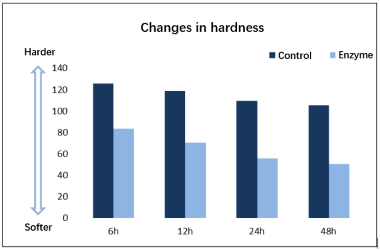Sunson launches Cellulase (SF-G) for areca nut and fibrous food softening
Introduction
Sunson's latest innovation, the Cellulase Enzyme (SF-G), is set to revolutionize the softening process of betel nuts and fiber-rich foods. This advanced cellulase solution is designed to enhance the texture and safety of high-fiber products, promoting oral health while leading the industry towards healthier standards. Let's explore how SF-G stands at the forefront of this technology.
The journey of cellulase research began in 1904 with its discovery in snail digestive juices. Over the decades, the field has evolved through three major stages:
- Pre-1980s: The early efforts focused on the biochemical separation and purification of cellulases. Due to the diverse sources and complex compositions of cellulases, progress was slow.
- 1980-1988: Advances in genetic engineering led to the cloning and sequencing of cellulase genes from various organisms such as Trichoderma reesei and Clostridium thermocellum. This period saw significant strides in understanding the primary structures and functionalities of these enzymes.
- 1988-Present: The focus has shifted to structural biology and protein engineering, exploring the molecular structures, catalytic mechanisms, and functional relationships of cellulases. This era has unveiled cellulases as complex enzyme systems, including exoglucanases, endoglucanases, and β-glucosidases, which act synergistically to degrade cellulose into glucose.
Cellulase enzymes function through a coordinated approach. The C1-Cx hypothesis, proposed by Reese in 1950, suggests that exoglucanases (C1) first bind and cleave crystalline regions of cellulose, followed by endoglucanases (Cx) which hydrolyze the polymer into cellobiose and other smaller molecules, and finally β-glucosidases (BG) which convert cellobiose into glucose. This theory has evolved, with the synergistic action of cellulase components now being the most widely accepted model. The enzymes work together to effectively degrade cellulose into glucose, supported by various hypotheses like the short-fiber formation hypothesis.
Applications of Sunson Cellulase (SF-G) in Betel Nut and Fiber Food Softening
Sunson is dedicated to advancing solutions for softening high-fiber betel nuts and lignocellulosic foods. Our Cellulase Enzyme (SF-G), derived from high-quality strains and refined through liquid fermentation, represents a significant advancement in this field. SF-G includes a balanced combination of cellulase and hemicellulase components, offering comprehensive breakdown of both crystalline and amorphous cellulose regions.
1. Effective Temperature Range: 20°C - 80°C
2. Optimal Temperature Range: 40°C - 55°C
3. Effective pH Range: 3.0 - 6.5
4. Optimal pH Range: 4.5 - 6.0
Laboratory tests (TPA data) indicate that using SF-G maintains the length and elasticity of fibers while progressively reducing their hardness with extended enzyme treatment (shown in the below figure).

Sunson Cellulase (SF-G) stands as a highly effective and stable solution for softening betel nuts and high-fiber foods. Its ease of use and consistent performance make it ideal for processing foods with high fiber and lignification. By minimizing the physical impact of high-fiber foods on the oral mucosa, SF-G helps reduce discomfort and health risks, promoting better oral health and advancing industry standards.

| E-mail: sunson@chinaenzymes.com |
| Tel:86-20-86586087 86-10-58246891 |
| Fax:86-20-86586895 86-10-58246862 |
